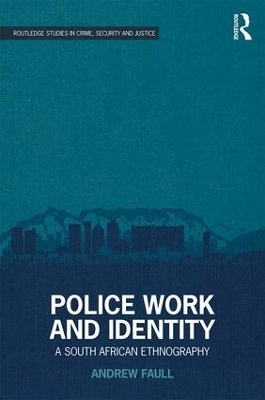
Police Work and Identity
A South African Ethnography
Seiten
2017
Routledge (Verlag)
978-1-138-23329-4 (ISBN)
Routledge (Verlag)
978-1-138-23329-4 (ISBN)
Drawing on a rich ethnography, this book demonstrates how the dynamics that lead to breakdowns in policing in transitional regimes such as South Africa, have their origins in the day to day experiences and ambitions of the average police officer.
This is a book about the men and women who police contemporary South Africa. Drawing on rich, original ethnographical data, it considers how officers make sense of their jobs and how they find meaning in their duties. It demonstrates that the dynamics that lead to police abuses and scandals in transitional and neo-liberalising regimes such as South Africa can be traced to the day-to-day experiences and ambitions of the average police officer. It is about the stories they tell themselves about themselves and their social worlds, and how these shape the order they produce through their work.
By focusing on police officers, this book positions the individual in primacy over the organisation, asking what policing looks like when motivated by the pursuit of ontological security in precarious contexts. It acknowledges but downplays the importance of police culture in determining officers’ attitudes and behaviour, and reminds readers that most officers’ lives are entangled in, and shaped by a range of social, political and cultural forces. It suggests that a job in the South African Police Service (SAPS) is primarily just that: a job. Most officers join the organisation after other dreams have slipped beyond reach, their presence in the Service being almost accidental. But once employed, they re-write their self-narratives and enact carefully choreographed performances to ease managerial and public pressure, and to rationalize their coercive practices.
In an era where ‘evidence’ and ‘what works’ reigns supreme, and where ‘cop culture’ is often deemed a primary socializing force, this book emphasises how officers’ personal histories, ambitions, and vulnerabilities remain central to how policing unfolds on the street.
This is a book about the men and women who police contemporary South Africa. Drawing on rich, original ethnographical data, it considers how officers make sense of their jobs and how they find meaning in their duties. It demonstrates that the dynamics that lead to police abuses and scandals in transitional and neo-liberalising regimes such as South Africa can be traced to the day-to-day experiences and ambitions of the average police officer. It is about the stories they tell themselves about themselves and their social worlds, and how these shape the order they produce through their work.
By focusing on police officers, this book positions the individual in primacy over the organisation, asking what policing looks like when motivated by the pursuit of ontological security in precarious contexts. It acknowledges but downplays the importance of police culture in determining officers’ attitudes and behaviour, and reminds readers that most officers’ lives are entangled in, and shaped by a range of social, political and cultural forces. It suggests that a job in the South African Police Service (SAPS) is primarily just that: a job. Most officers join the organisation after other dreams have slipped beyond reach, their presence in the Service being almost accidental. But once employed, they re-write their self-narratives and enact carefully choreographed performances to ease managerial and public pressure, and to rationalize their coercive practices.
In an era where ‘evidence’ and ‘what works’ reigns supreme, and where ‘cop culture’ is often deemed a primary socializing force, this book emphasises how officers’ personal histories, ambitions, and vulnerabilities remain central to how policing unfolds on the street.
Andrew Faull is a Senior Researcher at the Institute for Safety Governance and Criminology, University of Cape Town, Editor of South African Crime Quarterly, and author of Behind the Badge: the untold stories of South Africa’s police service members. He was previously a researcher at the Institute for Security Studies (ISS) and a police reservist (volunteer) in the South African Police Service.
1. Police work, personal identity, and context, 2. Police practice and the good shift, 3. The good shift as fiction, 4. More than police work: precarity, policing, and personal identity, 5. Ambition, shame, violence, and respect, 6. Individualism, transgression, coercion, and hope, 7. Accidental occupations in the post-colony
| Erscheinungsdatum | 23.09.2017 |
|---|---|
| Reihe/Serie | Routledge Studies in Crime, Security and Justice |
| Zusatzinfo | 4 Tables, black and white; 6 Line drawings, black and white; 6 Illustrations, black and white |
| Verlagsort | London |
| Sprache | englisch |
| Maße | 156 x 234 mm |
| Gewicht | 453 g |
| Themenwelt | Naturwissenschaften ► Geowissenschaften ► Geografie / Kartografie |
| Recht / Steuern ► Strafrecht ► Kriminologie | |
| Sozialwissenschaften ► Soziologie | |
| ISBN-10 | 1-138-23329-3 / 1138233293 |
| ISBN-13 | 978-1-138-23329-4 / 9781138233294 |
| Zustand | Neuware |
| Haben Sie eine Frage zum Produkt? |
Mehr entdecken
aus dem Bereich
aus dem Bereich
über eine faszinierende Welt zwischen Wasser und Land und warum sie …
Buch | Hardcover (2023)
dtv (Verlag)
CHF 33,55
Buch | Hardcover (2024)
Schweizerbart'sche, E. (Verlag)
CHF 33,55
Eine Einführung in die spezielle Mineralogie, Petrologie und …
Buch | Hardcover (2022)
Springer Spektrum (Verlag)
CHF 83,95


